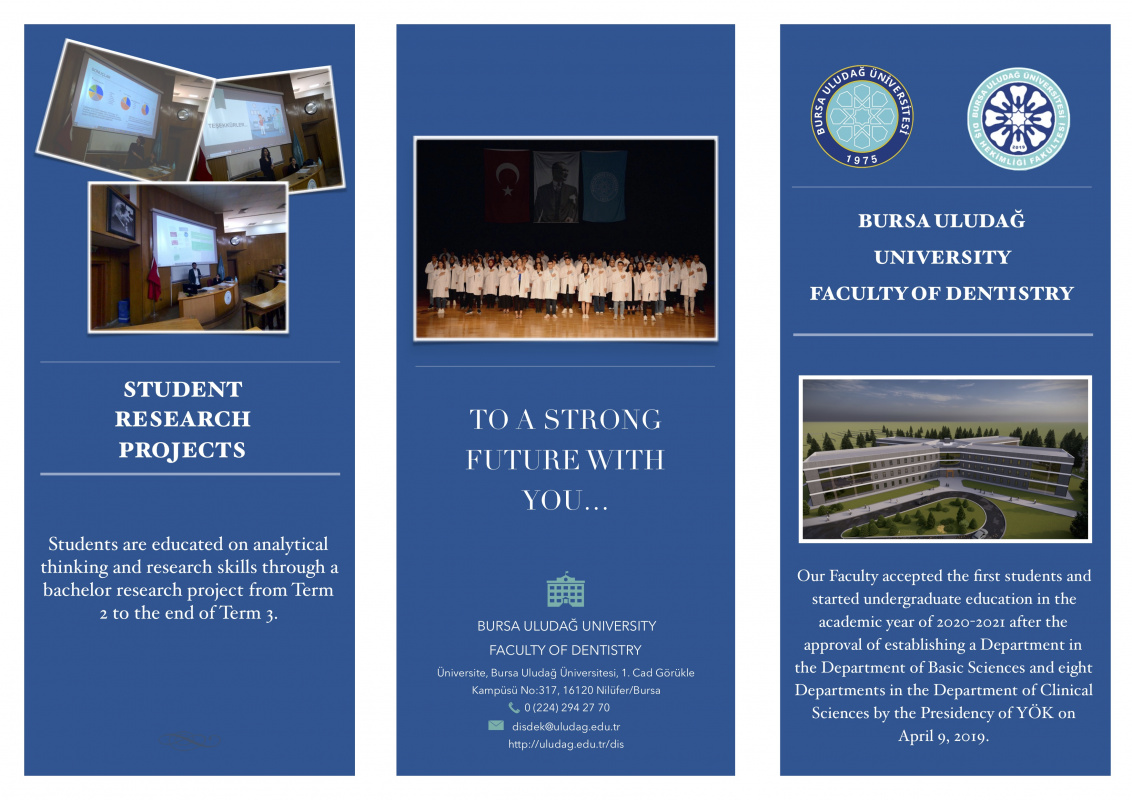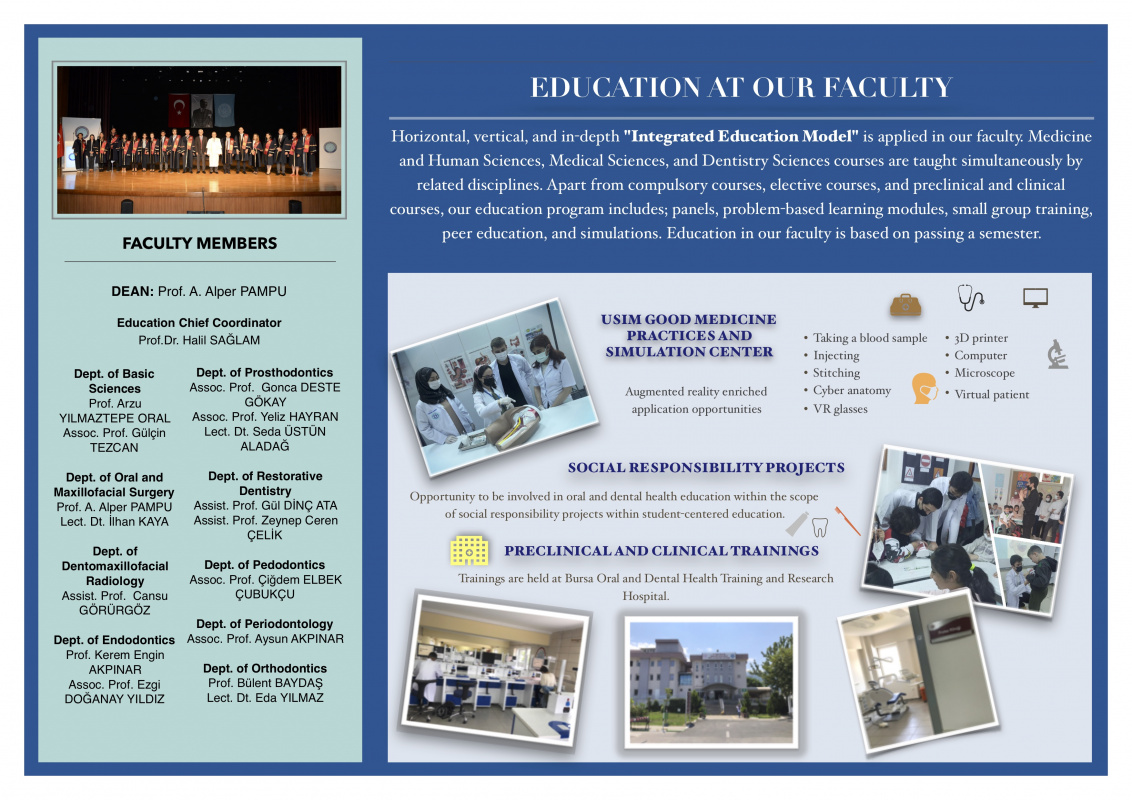Introductory Video 2023
Introductory Video 2022
Introductory Video 2021


UNDERGRADUATE EDUCATION AT BURSA ULUDAĞ UNIVERSITY FACULTY OF DENTISTRY
- The Faculty of Dentistry of Bursa Uludağ University, a well-established university in our beautiful UNESCO heritage city, completed all the necessary preparations and started education by accepting students for the first time in the 2020-2021 academic year. Within its young and dynamic staff and experienced faculty members, the dentistry faculty is delighted to educate you, the future dentist candidates, for the profession with contemporary approaches and modern technology. Our faculty will accept approximately 80 students for undergraduate education in the 2021-2022 academic year and will serve in 8 departments. The language of instruction is Turkish, and there is no preparatory class. Students who pass the language proficiency exam are exempted from foreign language courses taught in the classroom.
- The five-year education program of our faculty consists of three stages which are enriched with "student-oriented education," "problem-based learning," "small group training," "integrated lessons," and "panels," in addition to traditional education methods. "Stage I" consists of Term I and Term II, covering the first two years of our bachelor's education. At this stage, our students take theoretical courses on fundamental medicine and dentistry and professional practice courses in our preclinical and simulation laboratories. Stage II includes term III and term IV. At this stage, our Term III students attend theoretically and applied courses of fundamental medicine and dentistry and participate in clinical applications as observers to adapt to clinical practices. Term IV students will receive clinical training on the patient. "Stage III" covers the final year, Term V, and our clinical education at this stage is planned to be conducted based on the "Integrated Clinical Education" model instead of the discipline-based clinical education.
- Students personally follow the patient from the registration stage to the termination of the treatment during the integrated clinical education, similar to a dentist working in a clinic or a hospital. Thus, they will receive training in an environment closest to a dental clinic or an Oral and Dental Health Center, where a dentist most likely works after graduation. Instead, in discipline-based clinical education, students learn to treat patients based on a department-specific clinical practice instead of a holistic approach. In this education method, the student receives clinical training only within the department's approach, which does not consist of the opinions of other departments. Each department is expected to synthesize its education. In contrast, the student plans and completes the treatment of his/her patient under the opinion and supervision of many departments in integrated clinical education. Orthodontics, Pedodontics, and Oral and Maxillofacial Surgery Departments are not included in the integrated clinical education system.
- In "Medical Sciences," "Medical and Human Sciences," and "Dental Sciences" courses, the "Integrated Education Model" is applied. In this model, a subject is taught as a whole from simple to complex by all relevant departments. Thus, instead of a single discipline-based education, it is aimed to provide an education that enables the synthesis and use of the knowledge of different departments to solve the problems.
- The curriculum of the "Medical Sciences" and "Medical and Human Sciences" courses available in all semesters will be given mainly by the faculty members of Bursa Uludağ University Faculty of Medicine and, if necessary, by the faculty members of other faculties of our university, in line with the theory and practice of the dentistry profession.
- In "Medical Sciences" courses, students learn about the health and diseases of the human body, especially in the mouth, teeth, and jaw area. In "Medicine and Human Sciences" courses, our students acquire knowledge, equipment, and human skills that assist the field of medicine and dentistry, such as entrepreneurship, ethical and moral values, legal issues, sociology, philosophy, informatics, statistics, public health, health policies, evidence-based practices, scientific research, cooperation, teamwork, and leadership, which are necessary to carry out their profession in the best way when they graduate. In the "Dentistry Sciences" integrated course, topics that concern more than one department, such as preventive dentistry or karyology, are handled with a holistic approach.
- In addition, since our students will benefit from the simulation center of Bursa Uludağ University Faculty of Medicine, one of the few simulation centers in Turkey, they will always be one step ahead of other candidates in terms of practice and theory. Thus, they will have laid a solid foundation for their Clinical Sciences courses and will have the opportunity to study for the Dentistry Specialization Education Entrance Examination (DUS) better than their other colleagues.
- Our In-Field and Out-of-Field Elective Courses have been designed for our students' wide range of interests and hobbies.
- In Turkey, 59% of dentists work in private clinics, 26% in centers affiliated to the Ministry of Health, 12% in Dentistry Faculties, and 3% in other institutions. Our students who want to become a Specialist Dentist after graduation take the "Exam for Specialization in Dentistry Education" (DUS) conducted by Measuring, Selection and Placement Centre (ÖSYM) and receive specialized training in the field of their choice.

